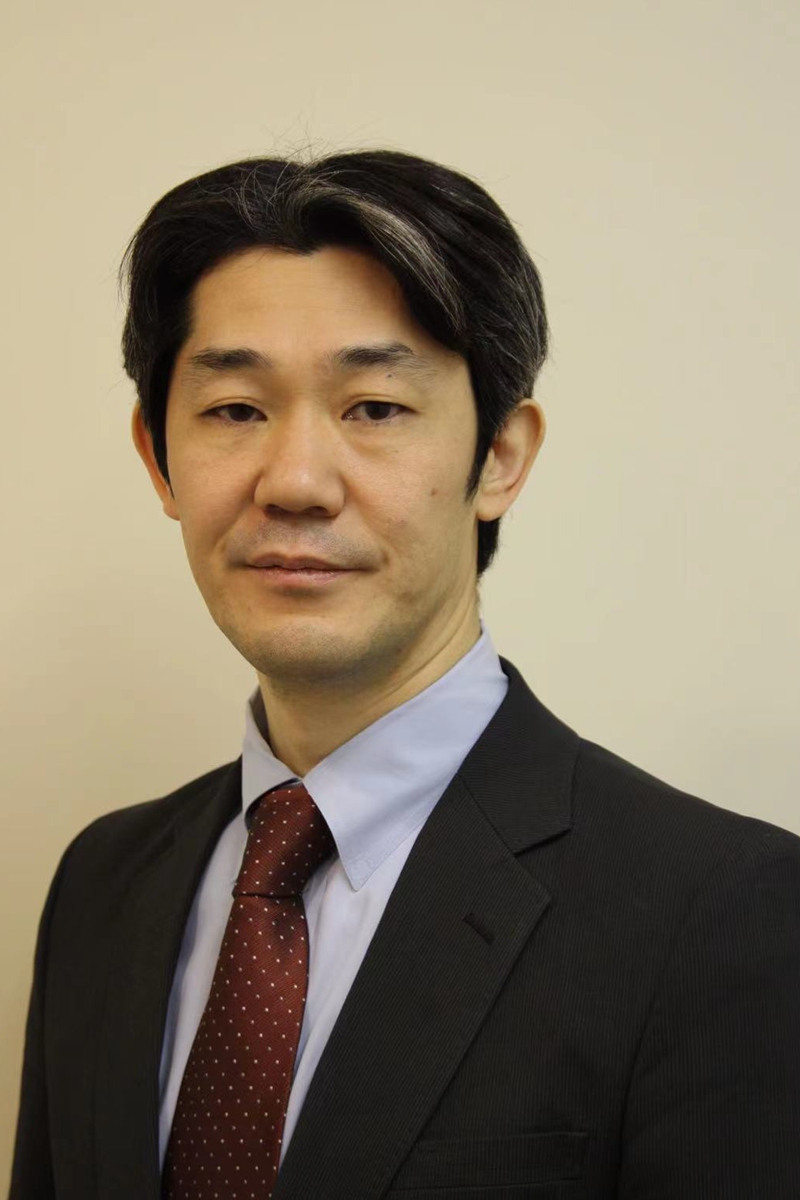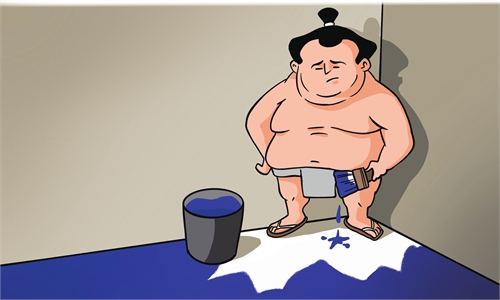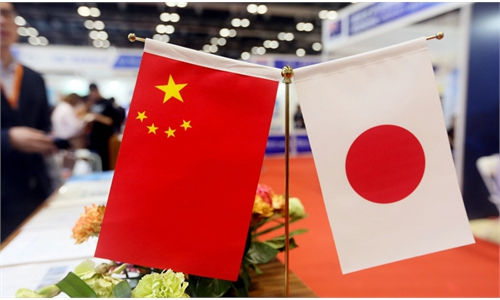Japan should be reminded that there is no good in fighting China: Japanese professor

Tomisaka Satoshi Photo: Courtesy of Tomisaka Satoshi
Without China, it will be difficult for Japan to survive; without China, Japan would not be able to prosper. Japanese professor Tomisaka Satoshi shared this view in his new book Anti-China sentiment will ruin Japan. As Japan is experiencing a growing right-wing populism and pro-US tendency, Satoshi's new book aroused heated discussions after its publication. Some commentators pointed out that Japan's anti-China rhetoric has become hysterical and it is necessary for Japan to think about China-Japan relations from a new perspective.
Global Times reporter Xing Xiaojing (GT) sat down with Satoshi for an exclusive interview.
GT: The anti-China rhetoric seems to have become a mainstream voice in Japanese society. Under such context, why do you say that this anti-China feeling will ruin Japan?
Satoshi: The biggest problem in diplomacy is the collision of feelings between peoples of different countries. If the feelings of the people of Japan and China fall into a collision state, it will be a loss for both sides. The fact that this clash between Japan and China has already emerged suggests that the relationship between the two countries is beginning to slide into a negative state. To avoid further aggravation of the situation, I published my new book Anti-China sentiment will ruin Japan.
If the anti-China sentiment runs high, of course, it will ruin Japan. But it does not mean that Japan will completely disappear. It means that Japan will suffer serious losses which is the main meaning behind the title of the book.
GT: What message does your new book want to convey most?
Satoshi: The world's growth engine is in Asia but this bonanza is limited. If we failed to take advantage of this period, the next growth engine may shift to Africa or other parts of the world. We can see that countries outside the region are also joining in the battle for interests with Asia which makes the situation even more complicated. It will be extremely dangerous for both Japan and China, two Asian powers, to "hurt each other." Under such circumstances, Asian countries, including Japan, should manage the "seeds of strife" and not miss the rare opportunity for development. Especially for Japan where growth is slowing, it is imperative to maximize economic growth during this windfall as it is related to Japan's future.
GT: Does it take courage to publish this book under the current public opinion environment in Japan?
Satoshi: Of course. In Japan, anti-China rhetoric now dominates public opinion. China experts in Japan are facing headwinds. As we all know, Japan's media environment is dominated by business news, which means they are interested in "selling news". In other words, journalists write about what readers like to read. Negative stories about China, such as "China is wrong," are welcome and prevailing rhetoric.
People who are good at marketing make easy money just by following the mainstream and "badmouth China". But there is a risk that a future clash of feelings between Chinese and Japanese citizens could lead to a stalemate that would benefit no one. I hope that before the lose-lose situation happens, Japan will be reminded to come down to earth and avoid emotional reasoning.
The Japanese always believe that it is necessary that everyone shares the same idea and are not very receptive to different views, which is rare in the international community. In this case, my ideas may come under fire because in Japan "non-mainstream" is often considered wrong. Even so, I will continue to make my point. Since there is no good for Japan to "fight" with China, I must point out the possible consequences before Japan regrets it.
Japan is accustomed to judging international issues in terms of right and wrong and is easy to fall into a huge trap. Japanese diplomacy has failed because of this. In fact, it is difficult for the Japanese, who are used to think in black and white, to make a sober judgment when international relations change according to the evolution of interests and risks.
GT: If Japan had previously tried to strike a balance between China and the US, it feels like it is now more pro-American. What do you think about this? Will Japan choose sides between China and the US?
Satoshi: Your observation is correct. Under pressure from the US, Japan's previously ambiguous stance was no longer allowed. Facing such pressure, it is particularly important for Japan to make realistic choices. I also mentioned in the book that Japan should be cautious if it cannot confirm the allegations of "forced labor" and "genocide" made by the US.
International relations can be regarded as "living creatures," and changes in diplomatic relations, particularly between major powers, are subject to gains and losses. As long as interests are aligned, even what is unthinkable at this stage could be possible in the future. For example, now it seems that relations between China and the US may be engaged in a long-term antagonism, but we cannot rule out that the relations will warm up. However, once relations between Japan and China are damaged, it is impossible to recover quickly.
If, for example, Japan and China were to fall into a real confrontation, there would be little room for Japan to change the situation. So, it is very dangerous for Japan to get emotional about its China policy and there will be losses.
From my point of view, Japan's understanding about China is completely inadequate. It did not collect enough information before judging right from wrong. I have introduced many things related to China in the book which I hope can be used as supplementary information for the Japanese society but ultimately it is up to Japanese readers to understand and think about it.
GT: Has Japan realized it?
Satoshi: No. The Japanese are not good at this kind of thinking. For example, when something happened, I was often asked "whose fault is this?" This makes me speechless. If all questions had simple answers, nothing in the world would require intensive study. Countries like China and the US are relatively accustomed to debate and think about other perspectives. You can understand the other person's point of view even if you cannot accept it. But Japan has a history of teachers telling students that "there is only one right answer", so all the efforts of Japanese people are in pursuit of that "right answer". I often tell students that in society, many questions have no answers and answers differ given different positions. But the Japanese are so used to this way of thinking and it is difficult to change. This thinking requires everyone to agree on the "right answer" and allow no other ideas.
GT: Japan was reserved on the Taiwan question. However, Japanese politicians have recently made repeated and inappropriate remarks on the Taiwan question. Does this indicate any change in Japan's position on Taiwan?
Satoshi: I do not quite understand why some politicians made those remarks about Taiwan recently. Maybe they think it is in their own political interest to do so.
But when it comes to the island of Taiwan, I do not think Japan wants to be actively involved. Japan simply wants to use the island as a tool to seek a more favorable situation on maritime issues.
In fact, Japan does not really understand the importance of the Taiwan question. The 1972 Sino-Japanese Joint Statement clarified the one-China principle but it has to be said that the Japanese people know very little about it. Therefore, many people cannot understand why China attaches such importance to the Taiwan question.
The lack of interest in China among the Japanese is not an unfounded lie. It is impossible for the average Japanese to read and understand the 1972 Sino-Japanese Joint Statement during the rest of the day when they are struggling to feed their families. Even if someone is willing to take the time to explain it to them, they may not be willing to listen. So, it is hard for the Japanese people to understand how serious the Taiwan question is and why China is so sensitive about it.
Many people in Japan do not know China's history. New methods are needed to deepen Japanese people's understanding about the Taiwan question. Perhaps the inability of the Japanese to put themselves in other people's shoes is also a factor that leads to the current situation.
GT: How do you evaluate Japan's rhetoric of decoupling from China?
Satoshi: Although some people are hyping up the idea of decoupling from China, only a few believe it is feasible considering the actual situation. This idea is not mainstream in Japan. The decoupling of China and the US alone is enough to have a serious impact on Japan. If Japan is decoupling from China there will be no more room for Japan's development and its economy will definitely be dealt a fatal blow. Therefore, the decoupling from China is impossible to realize.
GT: Some people in Japan are trumpeting the "China threat theory." Is Japan really afraid of China?
Satoshi: Yes. Japan has a "China phobia" and I think the Diaoyu Islands issue is one of the main reasons. In fact, from China's point of view, the dispute between China and Japan over the Diaoyu Islands cannot be resolved in the short term and China advocates "shelving the dispute." However, Japan tends to think that China will soon come to "seize the islands" and both sides are "surprised" when they hear the other's point of view. This accumulation of "surprises" is what led to today's situation. I think China and Japan should strengthen communications, resolve misunderstandings and make full use of the development opportunities in Asia to achieve win-win results.



